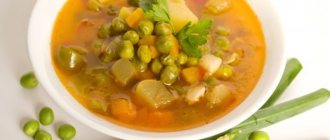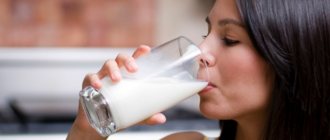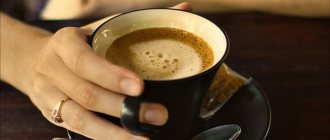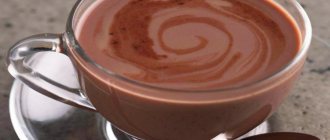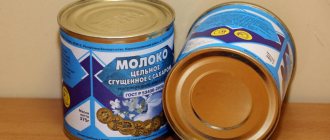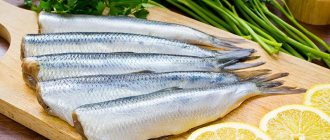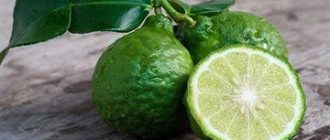09.11.201616.02.2017 Nadezhda Plotnikova 1 Comment
The combination of tea and milk is familiar to many people. Nursing mothers hear about it especially often, since this drink is considered a traditional remedy for improving lactation.
Despite centuries of experience in its use, there are quite conflicting opinions about the benefits of milkweed.
Some women confirm the usefulness of the drink, others are sure that it provokes colic in babies. Such an ambiguous attitude towards the product prompts us to figure out whether tea with milk is beneficial during breastfeeding and whether a nursing woman should drink it.
Is it possible for a nursing mother to have tea with milk?
The benefits of such a drink are obvious, if only because cow's milk contains many nutrients and vitamins, it is usually easily digestible, and its taste is high.
However, there are cases when it is better for a young mother to refuse milk:
- New milk. It's time to give up the misconception that the less time passes between milking the cow and drinking the milk, the healthier the drink will be. Firstly, the absence of any processing of milk increases the risk of ingesting, along with a set of necessary vitamins and nutrients, unwanted “passengers” - helminths and microorganisms that cause brucellosis, salmonellosis and botulism. Secondly, freshly milked milk also contains estrogens, which can completely worsen the natural process of lactation in a woman.
- Allergies and intolerances. If the mother has lactose intolerance or an allergy to cow protein, then drinking tea with milk for lactation will even be harmful. Cow's milk can also cause allergic reactions in infants. In most cases, the mother’s body copes admirably with “filtration”, and with mother’s milk the baby receives only what is necessary, but sometimes failures occur. If there are any symptoms of allergy in the mother or child, the consumption of milk tea, whole milk and fermented milk products should be stopped and consult a doctor.
Which tea to choose when breastfeeding
You need to decide on the type of tea that will bring less harm and more benefit to the baby.
Black and green tea are products collected from the same tea bush. The difference lies in the processing and fermentation system. Green tea undergoes less fermentation, so it has a more natural taste and healthy composition. Black tea is highly processed, due to which it has less benefits, but more pleasant sensations when consumed.
The choice of tea is huge. But the main condition is that it must be of high quality.
Black tea with milk
This drink contains many useful substances, such as: ascorbic acid, vitamins K and PP, fluorine, tannin, phosphorus, tannins. Milk not only complements the taste of tea, but also reduces the effects of caffeine. Although only 1% of this stimulating substance reaches the baby, which is not critical. But as mentioned above, provided that it is used correctly and there is no reaction from the child, black tea with milk will only benefit mother and baby.
The benefits of the drink for mother and baby
Green tea with milk
Green tea contains more vitamin C and antioxidants, making it more valuable than black tea. It improves metabolism, accelerates metabolic processes, which helps normalize weight. Its ability to remove toxins from the body is also known. In case of poisoning, it quickly normalizes the condition.
It has the ability to normalize the functioning of the nervous system and has a calming effect in cases of depression, stress and nervous tension. Increases the immunity of mother and baby.
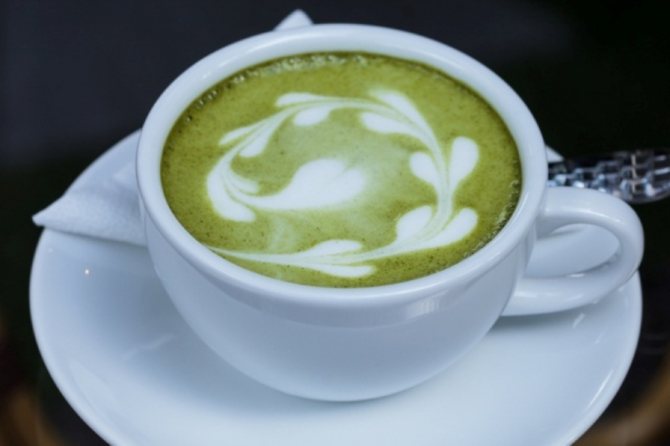
Green tea with milk contains more beneficial elements than black tea
Does milk tea help with lactation?
Meanwhile, scientists and well-informed doctors do not find incredible lactogenic properties in any tea-milk combinations. A warm drink drunk shortly before feeding will in most cases be accompanied by a rush of milk at the time of feeding or pumping. You can just drink warm water, the effect will be the same.
On the other hand, with a great love for the taste of tea with milk and the absence of contraindications such as allergies, milk tea will be better at least because it will bring more joy to the young mother, which is also valuable.
Keep track of the amount of tea you drink, because it also contains caffeine, which can harm the baby or the mother's sleep pattern. It is usually recommended not to drink more than 750 ml per day.
Any liquid intake during breastfeeding should be primarily as desired. If drinking milk tea is unpleasant, you should not forcefully pour it into yourself - it may turn out that the stress from unpleasant drinking will become a factor in the reduction, rather than the increase, of milk.

Benefits of tea for lactation
During breastfeeding, some women experience a lack of milk. Pharmacy chains offer a wide selection of drugs to enhance lactation, but nursing mothers prefer the old and proven method, which promotes the discharge of nutrient fluid from the mammary glands.
The common belief about increasing milk production with tea is erroneous. The volume of natural product can be affected by the physiological characteristics of the woman and the frequency of feeding the child.
Tea during breastfeeding only facilitates sucking by increasing the flow of milk to the breast.
Milk tea has other beneficial properties that nursing mothers should also know about:
- “Milk tea” contains a large amount of mineral components and vitamins. This allows the new mother to quickly regain strength after a tedious birth process, and increase the body’s defense and resistance to various viruses.
- Teas with milk improve a woman’s emotional mood and promote relaxation, and a positive mood is transferred to the child, which calms and reduces the severity of colic.
To improve product elimination, mothers should drink tea 30 minutes before feeding the baby. Warm drinks dilate the ducts of the mammary glands, which makes it easier for the child to access nutrition. However, many other warm drinks have similar qualities.
Why tea with milk increases lactation
Drinking a warm drink before feeding to increase breast milk lactation is one option to help the mother’s body adjust to feeding; this method has also worked well in combination with a warm shower. The effect of increasing milkiness from tea with milk is caused not by its composition, but by the temperature of the drink and the time of consumption. Probably everyone has noticed how after a hot or warm drink they feel feverish. This is how we feel the effect of vasodilation.
A nursing mother, of course, should not drink boiling water, but a warm, non-scalding drink will have an effect: oxytocin will be released, the blood vessels will dilate, the blood flow will increase, and it will rush to the organs, supplying them with oxygen.
Not only the blood vessels expand, but also the milk ducts of the nursing mother - it becomes easier for the milk to “come out”, and the baby spends less effort to eat. This effect is associated with the misconception about the incredible effect of tea with milk: in fact, there will be the same amount of milk, but the baby will be able to get it in a shorter time.
Baked milk on a nursing mother's menu
If we talk about the diet of a nursing woman, then the possibility of introducing this or that product into it is always combined with the “if” clause.
Baked milk is no exception. This product, which has the taste of an exquisite delicacy, is obtained in a special way when fresh cow's milk is exposed to a prolonged temperature of about 90 degrees. This ancient method allows you to preserve all the useful components. But during the production process, some of the liquid is lost, which increases the fat content of the resulting product. Baked milk also has a pleasant beige or creamy tint. As the fat content of the final product increases, the concentration of allergens also increases. This may include lactose and casein, to which some women are hypersensitive. Even in cases where the mother tolerates this component well, but the child’s father’s body does not accept it, such milk must be introduced into the mother’s menu with extreme caution.
Milk tea recipes to increase lactation
To improve breast milk lactation, it is best to choose tea with a lower caffeine content, avoid strong black tea, and especially not drink coffee. But you can make tea with milk based on all kinds of herbal infusions, rosehip drink, linden blossom, raspberry leaves, ginger and green tea, there are a lot of options. It’s impossible to say which recipe is better to choose, it all depends on personal preferences.
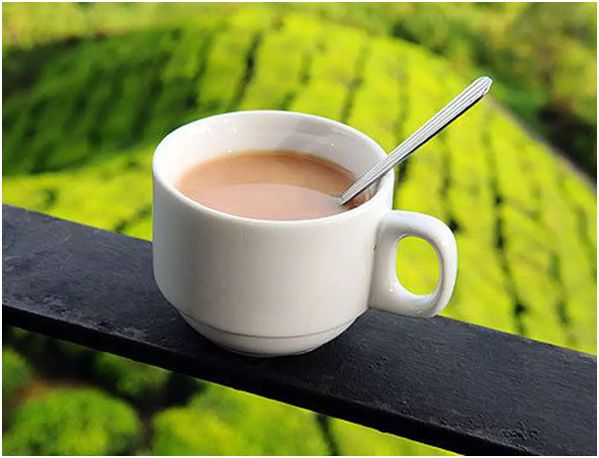
Green tea with linden blossom and milk
Place green tea and linden blossom into a preheated teapot. The amount of tea leaves is usually determined by taste, approximately 2/3 teaspoon of both per 250 ml of water.
Bring water to a boil with a white key, pour in the tea leaves and leave to infuse. In the meantime, you can heat (but do not boil) the milk and pour it into a cup. Tea is poured into heated milk in equal proportions.
During breastfeeding, it is better to avoid honey as a sweetener, since it is one of the strongest allergens.
Ginger tea with milk
Pour a teaspoon of tea leaves and a teaspoon of fresh grated ginger root without peel with 1.5–2 cups of boiling water. Stir and leave to infuse. Heat 1.5–2 glasses of milk and pour into tea. It is better to drink this drink by first straining it through a fine sieve.
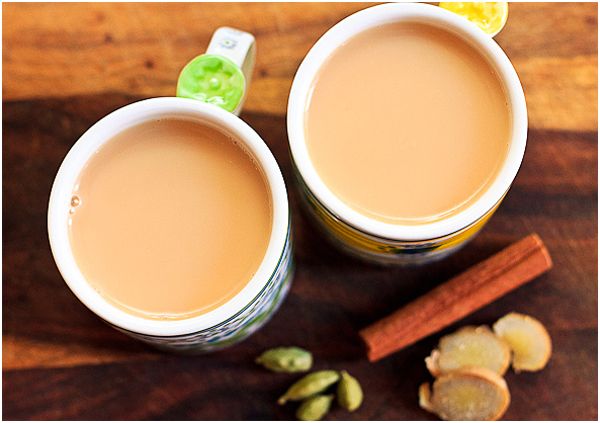
You can drink milk tea:
- both before and after feeding,
- regardless of feeding period
- and throughout the entire period of lactation, up to 750 ml per day.
Because the milk in the mother’s breast... does not react in any way to the flow of milk into the woman’s body from tea - it neither increases nor decreases in any way. The tea itself can be either black or green. And you can drink it either hot or cold, as desired.
There is also an opinion that it fresh milk during breastfeeding, as it can reduce lactation by affecting the mother’s hormonal levels. But you’re unlikely to put fresh milk in your tea, right?
What Komarovsky says
Evgeny Olegovich Komarovsky, a famous pediatrician, writer and TV presenter, comments on the question of the advisability of drinking milk drinks and tea: a child needs a satisfied and joyful mother, and if the child is healthy, and tea with milk helps the mother to be in a good mood, then he will certainly , useful.
Typically, the dairy products that the mother eats do not affect the baby and do not cause colic. If the issue of colic arises acutely, then you should first try to reconsider the amount of food the child eats; colic can be caused by overeating.
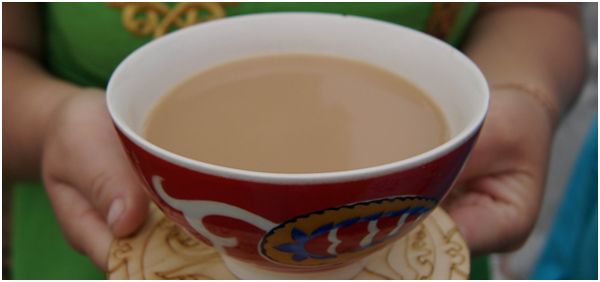
When can it be introduced into the diet?
In the first three months of breastfeeding, the mother must strictly adhere to a number of dietary restrictions. Therefore, until the baby is three months old, there can be no talk of food variety. But after this period it is allowed to gradually add baked milk to food.
You should start with a few spoons, and you must monitor the condition of the baby, his skin and the nature of his stool. If no deviations are noticed, you can continue to increase the presence of high-calorie dairy products in the diet of a nursing woman. But you shouldn't abuse it. A glass of milk a day is enough to meet the needs of the baby and his mother.
cheese while breastfeeding
Reviews
Ekaterina: At first, my daughter didn’t have enough milk, and, in my opinion, everyone who was not too lazy advised me to drink tea with milk - grandmother, mother, even grandfather joined in. I don’t know how it was supposed to work, but the taste of it made me sick and I couldn’t drink more than a couple sips. Then there was more milk, but I think it was from the application, and not from the tea.
Sasha: When the lactation crisis happened, I was so scared that I drank everything that was not nailed down - tea with condensed milk, with milk, lactogenic teas from the pharmacy (which are herbal), I was afraid to starve the child. They told me to be less nervous, but how can I not be nervous... In the end, breathing exercises and a shower helped more than tea.
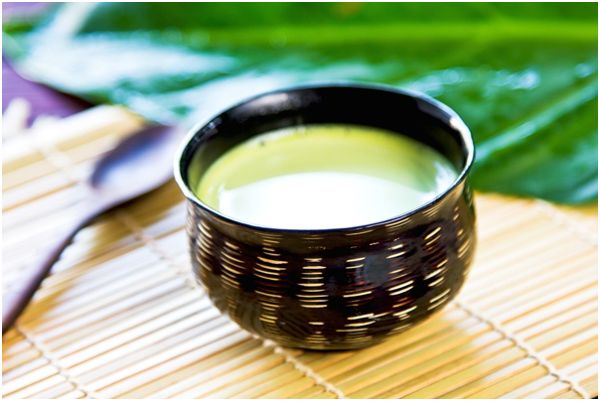
Reviews of milk tea as a drink that stimulates lactation are quite mixed. Some people feel it helps, but others can’t stand its taste so much that there can be no talk of any relaxation or good mood. Yes, a nursing mother needs to drink more, but what exactly it will be is not so important, as long as it is not alcohol.
And a few more recommendations:
- if you want to quench your thirst, it is better to give preference to pure water rather than other drinks. I would like to explain a little about water, because the topic is very important.
I think you've heard that the recommended consumption of clean water per day is at least one and a half to two liters. Let us emphasize - pure water, teas and juices do not count.

So, after the birth of a child, you also need to drink this amount of water. If you, being afraid of the stories of “well-wishers” and having heard a lot of scary tales about wild swelling after childbirth, reduce the amount of water you drink, then the body, noticing this, will get scared and begin to react. In particular, the breasts will swell, as if they are bursting from the inside. And this is not due to the flow of breast milk, but because of the arrival of lymph, because there is no water in the body! So don't listen to anyone and drink some water.
In addition, drinking the right amount of water will help you prevent lactostasis.
True, water does not contribute to the production of breast milk. That is, there is no connection between how much you drank and how much milk arrived. She does not influence this process in any way; she has a different task - namely, to maintain the mother’s health at the same level, to make up for losses.
- It’s better to forget about all sorts of different sodas and similar “bottle” joys for the duration of the GW, since they contain a lot of nastiness
- alcohol during lactation , because this may reduce the amount of milk for your baby.
This is a sample menu recommended for women breastfeeding:
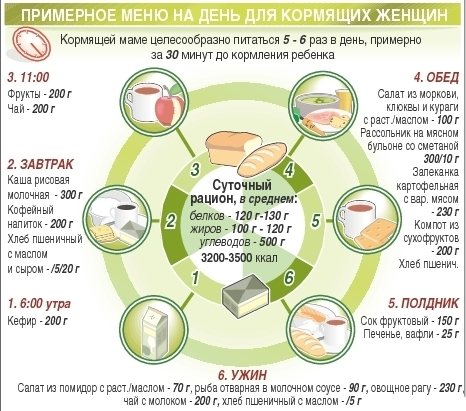
If you want to find out whether milk tea can be given to children and, if so, at what age, then read the article. Well, if you are curious about what teas can be given to a child, then we are waiting for you in our special section “Tea for Children”.
At the end of the article, we suggest you watch a useful and short video, from which you will learn about what else you should drink during breastfeeding, what you shouldn’t, and why.
